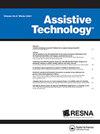RESNA对躺姿护理管理辅助技术的研究进展。
IF 2.5
4区 医学
Q1 REHABILITATION
引用次数: 0
摘要
这篇关于躺姿护理管理(LPCM)辅助技术的RESNA立场文件的目的是为了使学术研究和临床最佳实践保持一致。躺姿虽然在体位护理中至关重要,但在政策和临床设置中都没有得到充分解决,以帮助从业者决策和证明LPCM建议的合理性。立场文件将LPCM框架在24小时姿势护理管理(PCM)模型中,强调其在预防体型扭曲,减少健康并发症和增强行动不便个人参与方面的作用。本文章由计算机程序翻译,如有差异,请以英文原文为准。
RESNA position on assistive technology for lying posture care management.
The purpose of this RESNA position paper on assistive technology for lying posture care management (LPCM) serves to align academic research and clinical best practices. Lying posture, although critical in postural care, is under-addressed in both policy and clinical settings to assist practitioners in decision-making and justification of LPCM recommendations. The Position Paper frames LPCM within the 24-hour posture care management (PCM) model, highlighting its role in preventing body shape distortions, reducing health complications, and enhancing participation for individuals with limited mobility.
求助全文
通过发布文献求助,成功后即可免费获取论文全文。
去求助
来源期刊

Assistive Technology
REHABILITATION-
CiteScore
4.00
自引率
5.60%
发文量
40
期刊介绍:
Assistive Technology is an applied, scientific publication in the multi-disciplinary field of technology for people with disabilities. The journal"s purpose is to foster communication among individuals working in all aspects of the assistive technology arena including researchers, developers, clinicians, educators and consumers. The journal will consider papers from all assistive technology applications. Only original papers will be accepted. Technical notes describing preliminary techniques, procedures, or findings of original scientific research may also be submitted. Letters to the Editor are welcome. Books for review may be sent to authors or publisher.
 求助内容:
求助内容: 应助结果提醒方式:
应助结果提醒方式:


